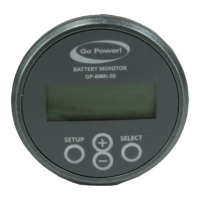[page 10] | gpelectric.com
4.2.2 CHARGE EFFICIENCY (CEF)
The charge eciency of a lead acid battery is almost 100% as long as no gas generation takes place. Gassing
means that part of the charge current is not transformed into chemical energy, which is stored in the plates of the
battery, but is used to decompose water into oxygen and hydrogen gas (highly explosive!). The Amp-hours stored
in the plates can be retrieved during the next discharge, whereas the Amp-hours used to decompose water are
lost. Gassing can easily be observed in ooded batteries. Please note that the oxygen only end of charge phase of
sealed (VRLA) gel and AGM batteries also results in a reduced charge eciency.
A charge eciency of 95% means that 10Ah must be transferred to the battery to get 9.5Ah actually stored in the
battery. The charge eciency of a battery depends on battery type, age and usage.
The GP-BMK-50 takes this phenomenon into account with the charge eciency factor. (See section 4.2.2, setting
number 06.
4.3 BATTERY STATE OF CHANGE DISPLAY OPTIONS
The GP-BMK-50 can display both the Amp-hours removed (consumed Amphours readout, compensated for charge
eciency only) and the actual state of charge in percent (state of charge readout, compensated for charge eciency
and Peukert eciency). Reading the state of charge is the best way to monitor the battery.
The GP-BMK-50 also estimates how long the battery can support the present load, the time to go readout. This
is the actual time left until the battery is discharged to the discharge oor. The factory setting is 50% (See 4.2.2,
setting number 16).
If the loads are uctuating heavily, it is best not to rely on this reading too much since it is a momentary readout
and must be used as a guideline only. We always encourage the use of the state of change readout for accurate
battery monitoring.
4.4 HISTORY DATA
The GP-BMK-50 stores events which can be used at a later date to evaluate usage patterns and battery health.
Select the history data menu by pressing ENTER when in normal mode (See section 4.3).
4.5 USE OF ALTERNATIVE SHUNTS
The GP-BMK-50 is supplied with a 500A/50mV shunt. For most applications, this should be suitable, however, the
GP-BMK-50 can be congured to work with a wide range of dierent shunts. Shunts of up to 9999A and/or 75mV
can be used.
When using a shunt other than the one supplied with the GP-BMK-50, please proceed as follows:
Unscrew the PCB from the supplied shunt.
Mount the PCB on the new shunt, ensuring that there is good electrical contact between the PCB and the shunt.
Connect the shunt and GP-BMK-50 as shown in the quick installation guide.
Follow the set-up wizard (Section 1.1 and 1.2).

